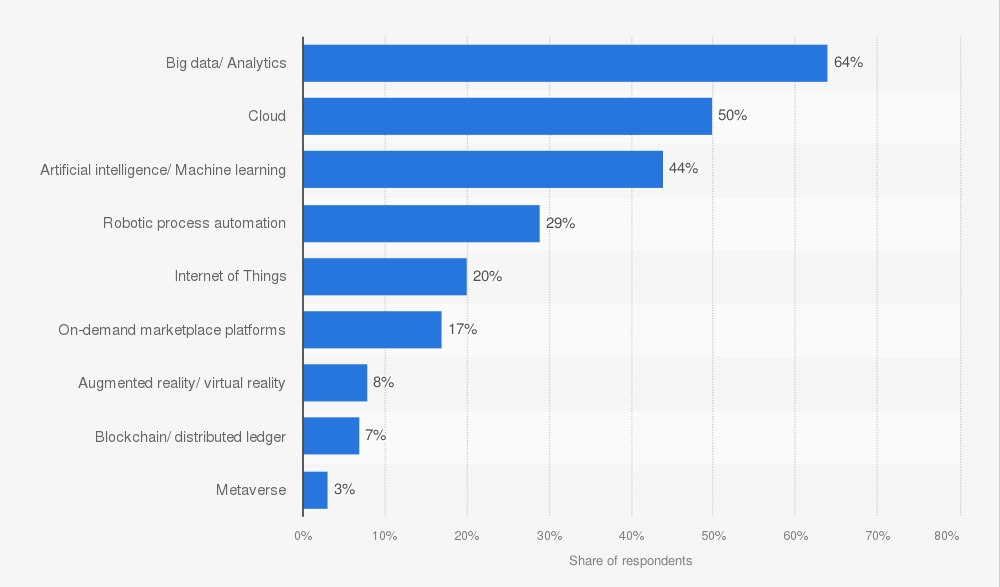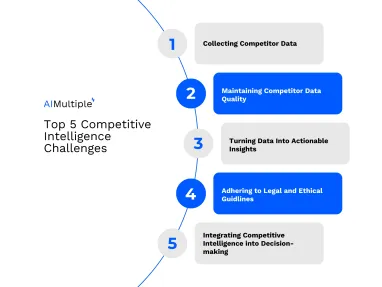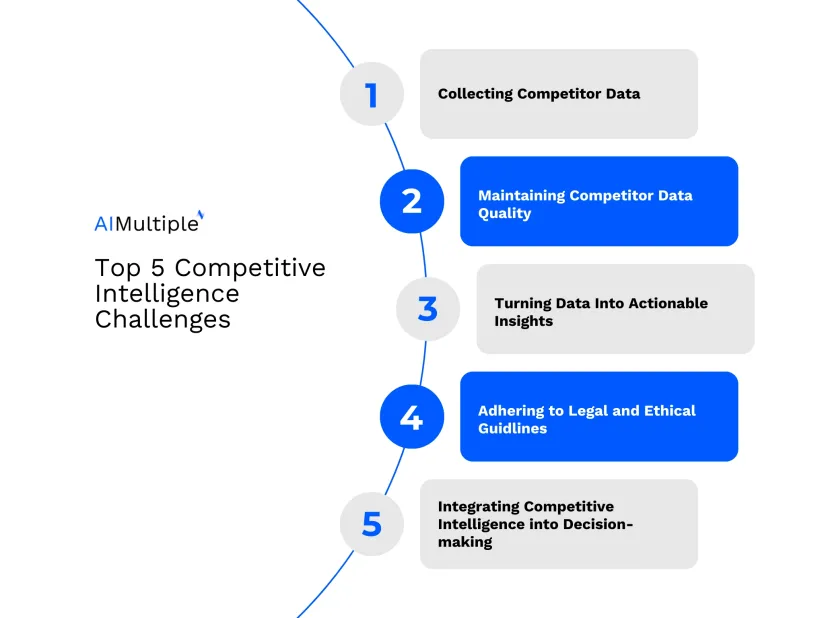In the current increasingly competitive business environment, maintaining an edge over rivals has become challenging. Look at ChatGPT as an example, it has only been a few months since it was launched, and it already has various competitors, including Google’s Bard.
Business leaders can face various challenges on the road to achieving competitive intelligence. Therefore, we have curated this article to help them identify and overcome some important challenges of implementing competitive intelligence practices in their own successful business strategies.
This research explains what competitive intelligence means, deep dives into the top 5 common challenges business leaders face while implementing competitive intelligence practices, and offers some practical solutions to help businesses navigate these obstacles.
By mastering competitive intelligence, your organization will be better positioned to:
- Adapt to market changes
- Identify new opportunities
- Stay ahead of the competition
If you wish to leverage an automated competitive intelligence solution, check out this guide to finding the right vendor for your business.
What is competitive intelligence?
Competitive intelligence (CI) refers to the process of gathering, analyzing, and interpreting data about your competitors, their products, customers, and the overall market landscape. CI enables organizations to make informed strategic decisions, anticipate market shifts, and ultimately, gain a competitive advantage.
Challenge 1: Collecting competitor data
Businesses nowadays have many competitors since numerous startups and companies are added to almost every industry each year. Unilever, for instance, has nearly 300 competitors. That gives a lot of data for your marketing managers to manage.1 Sifting through significant amounts of information and transforming raw data into actionable insights can be an overwhelming task.
This is mainly due to:
- The volume and variety of data
- Accuracy concerns
- Limited access to competitor’s platforms
- Dynamic competition landscape
Ensuring data quality, staying up-to-date, and employing appropriate analysis techniques of data from a large number of competitors can be challenging.
Some ways to overcome this barrier include:
- Implement an AI-powered competitive intelligence tool to streamline the competitor data collection process.
- Use a combination of primary and secondary research methods, such as surveys, interviews, competitor websites, social media, and industry reports.
- Develop partnerships with industry experts, attend conferences, and subscribe to relevant newsletters.
- If your competitor base is large, assign a dedicated team responsible for maintaining and organizing data, and regularly review and update the information.
Suppose a smartphone manufacturer aims to understand its competitors’ pricing strategies. It could use an AI-powered competitive analytics solution to set up automated alerts for competitors’ websites and social media channels to track price changes, gather industry reports for a broader perspective, and conduct surveys with customers to obtain their opinions on pricing preferences.
Sponsored
Bright Data offers an AI-powered platform with competitive analytics capabilities that can help businesses gather actionable insights on competitors’ practices to stay ahead of the curve. The platform offers:
- Data analytics of multiple competitors
- Track competitor pricing for their products and services
- Monitor competitor product catalogs to help you improve yours
- Monitor consumer sentiment toward your brand
Challenge 2: Maintaining competitor data quality
Maintaining the quality of gathered competitor data can be challenging due to the following factors:
- Competitors may intentionally mislead or conceal information, making it difficult to obtain accurate and comprehensive data.
- eCommerce websites like Walmart and Amazon implement dynamic pricing strategies to adjust product prices based on factors such as demand and supply. Data may become outdated, requiring continuous monitoring and updating to ensure its relevance.
- The sheer volume of data available can make it difficult to separate useful and accurate information from irrelevant or incorrect data.
Some solutions/recommendations to consider:
- Establish clear data collection protocols and quality control measures.
- Identifying reliable sources of information and regularly updating the sources.
- Use automation for data collection, data cleansing, and data integration to ensure data accuracy and consistency.
- Conduct regular audits of data to identify and correct errors or inconsistencies.
- Standardizing data formats and definitions to ensure consistency across different sources.
- Provide regular training and development opportunities to analysts to improve their analytical skills and expertise in data management and analysis.
Challenge 3: Turning data into actionable insights
Studies (Figure 1) show that data analytics and Big data are most beneficial in bringing competitive advantage to organizations.
Extracting meaningful and actionable insights from raw data is an important aspect of conducting competitive intelligence research. However, it can be challenging due to the sheer volume and complexity of the data. The challenge lies in the diverse nature of data sources, including social media, customer reviews, product marketing, websites, and news articles, which often result in an overwhelming amount of information to process.
Moreover, the complexity arises from the varying data formats, such as structured (tables, spreadsheets) and unstructured data (text, images, videos), which require different tools and techniques for effective analysis.
Some solutions/recommendations to help overcome this barrier:
- Employ skilled analysts with industry experience who can identify valuable trends and patterns in the data.
- Utilize an all-in-one, AI-powered competitive intelligence solution with data visualization capabilities to present data in an easy-to-understand format that aids in decision-making.
- Share insights regularly with key decision-makers and involve them in the analysis process.
- Invest in ongoing training and development programs to enhance your competitive intelligence team’s analytical skills.
Suppose a software development company collects data on its competitors’ marketing channels and content strategies. By employing skilled analysts and competitive intelligence tools, the company can identify which sales channels and content types resonate most with their target audience, allowing them to optimize their own marketing efforts accordingly.
Figure 1. Top technologies helping organizations achieve competitive advantage

Source: Statista
Challenge 4: Adhering to legal and ethical guidelines
Ensuring compliance with legal and ethical standards, such as CCPA and GDPR, when collecting and using data on competitors is critical. Complying with regulations helps maintain your organization’s reputation and avoid legal repercussions.
This can be challenging because of the complexity and diversity of laws and regulations across jurisdictions. Ensuring compliance requires dedicated resources (e.g., a legal team), specialized knowledge, and ongoing monitoring, which can be costly and time-consuming.
Navigating ethical aspects of competitive analysis can be subjective and less clear-cut. Balancing valuable insights with ethical standards is only sometimes straightforward, particularly in competitive industries. A strong organizational culture that values integrity and fosters ethical decision-making is crucial for maintaining ethical practices.
Some ways to overcome this challenge:
- Familiarize your competitive intelligence team with industry best practices and legal regulations.
- Establish a clear code of ethics for data collection and utilization.
- Read the terms of use of the target website and use only publicly available information.
Challenge 5: Integrating competitive intelligence into decision-making
Competitive intelligence is only valuable when it is effectively integrated into your organization’s strategic decision-making processes. Integrating competitive intelligence into strategic decision-making is challenging due to the complexity of the competitive landscape and internal organizational dynamics. Synthesizing information from diverse sources, ensuring data accuracy and timeliness, and utilizing specialized tools and expertise to analyze large volumes of data are all significant challenges faced by organizations.
Effective communication and collaboration between departments, stakeholders and decision-makers is essential, but organizational silos, resistance to change, and the lack of a data-driven culture can hinder the adoption and use of competitive intelligence. To overcome these challenges, organizations must invest in employee training, create cross-functional teams, and foster a culture that embraces data-driven decision-making.
Solutions/recommendations to overcome this challenge:
- Establish clear communication channels between the competitive intelligence team and decision-makers.
- Present actionable insights in a concise and compelling manner, ensuring that the information is easily digestible.
- Encourage a culture of data-driven decision-making within the organization.
- Regularly review and adjust strategies based on the latest competitive intelligence insights.
- Hypothetical example:
Conclusion
Mastering competitive intelligence is crucial for organizations seeking to stay ahead in today’s competitive business environment. By overcoming the challenges, businesses can harness the power of competitive intelligence to make informed strategic decisions, capitalize on emerging trends and opportunities, and outperform their rivals.
By implementing the practical solutions and recommendations outlined in this article, your organization can effectively navigate the barriers to achieving competitive intelligence, ultimately paving the way for sustained success.
Further reading
- E-commerce Competitive Intelligence: 5 Benefits & Tools
- Top 10 Competitive Intelligence Tools & Selection Guide
External references
External Links
- 1. Unilever. Tracxn April 8, 2023. Accessed: 09/April/2023.



Comments
Your email address will not be published. All fields are required.